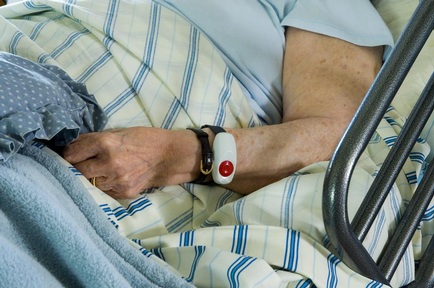Home care workers urged to look out for signs of sexually transmitted diseases
Home care workers are being urged to look out for signs of sexually transmitted diseases in the people they care for, after the Health Protection Agency revealed an increase in STIs in older people for the first time.
Colin Angel, policy and campaigns director at United Kingdom Homecare Association said: “Homecare workers can often be the only care professional someone using care services sees on a daily basis. They are therefore well placed to identify users’ concerns about their health, or recognise abnormal symptoms, including those which may result from a sexually transmitted infection(STI).”
He added that “this does not necessarily mean that care workers should be expected to diagnose illness, but they must be able to identify variations from the user’s ‘normal’ condition and report back. This clearly needs to be done sympathetically and referrals to appropriate health professionals – usually with the help of their managers – must be made with the user’s full consent, while respecting their right to confidentiality.”

Recent figures from the HPA show an increase in all of the five main sexually transmitted infections (STIs) aged over 50.
The figures showed 45 to 64-year-olds had the biggest rise in syphilis, herpes, chlamydia and genital warts between 2000 and 2009. They also saw the second-biggest rise in gonorrhea cases, beaten only by the over 65s.
Cases of syphilis in 45 to 64 year-olds rose from just 52 in 2000 to 503 in 2009. In the over 65s, cases more than quadrupled from just 7 in 2000 to 32 in 2009.
Dr Gwenda Hughes, head of STIs at the Health Protection Agency said: “Although rates of infection are highest in young adults, we have seen an increase in diagnoses in all age groups, including those aged over 45. We are doing more testing and using more sensitive tests, which means we are picking up more infections, however, we think the rise may also be due to more people having unsafe sex.
She emphasized that “anybody who has a new sexual partner is at risk of an STI, whatever their age” and said: “It is important to continually reinforce the safe sex message: if you have a new or casual sexual partner, using a condom is the surest way to avoid a sexually transmitted infection.”
In 2010, HPA STI figures showed HIV diagnoses had doubled in the over 50s age group in the past decade.
Ruth Smith, a senior HIV scientist at the HPA’s Centre for Infections estimated “nearly half of older adults diagnosed between 2000 and 2007 were infected at age 50 or over and this highlights the importance of HIV testing – whatever your age.
“We must continually reinforce the safe sex message – using a condom with all new or casual partners is the surest way to ensure people do not become infected with a serious sexually transmitted infection such as HIV.”
Regardless of sexuality, older people can feel uninformed entering into a new sexual relationship, especially if their last relationship had been long-term with their previous partner.
Sex lives were very different when the current generation of older people were in their 20s.
The importance of using a condom must be communicated to older people, who may not have used them for many years. Women may have stopped using them with their husband or long-term partner when they were on the pill, or knew they were no longer able to get pregnant. And likewise men may have stopped using them as they knew there was no risk of getting their wife or partner pregnant.
Enid Povey, senior nurse at NHS Direct, told homecare.co.uk: “Whatever your age, if you don’t practice safe sex you are at risk of contracting and passing on sexually transmitted infections (STIs), including herpes, chlamydia, genital warts, gonorrhoea, and HIV.
“Remember, some STIs (like chlamydia) don’t have any noticeable symptoms, so you could be infected without knowing about it. That means that it’s really important to get a check-up as soon as you can if you’ve had unprotected sex.

“If you do experience any of the following symptoms get tested as soon as possible:
• an unusual discharge from the vagina or penis (a strange colour or smell)
• pain when urinating
• itching, burning or tingling around the genitals
• blisters, sores, spots or lumps around the genitals or anus
• pain during sex
• lower abdominal pain
“If you don’t want to go to your usual GP, you can get tested and treated at a sexual health clinic or genitourinary medicine (GUM) clinic.
“Some pharmacies can also carry out tests and give advice, or you can use the NHS Direct Sexual Health Online Health and Symptom Checkers: http://www.nhsdirect.nhs.uk/en/CheckSymptoms/Topics/SexualHealth
“The best way to protect against STIs is to always use condoms when you have sex. Remember to buy condoms that have the CE mark on the packet, as this means that they’ve been tested to high European safety standards.”
The Family Planning Association told homecare.co.uk that it is important older people don’t feel embarrassed about discussing condoms with a partner. It recommends having a practice conversation with a good friend first, so you know what you’re going to say.
The FPA also wants to stress that sexual health clinics are not just for young people. Any age group is entitled to receive help and advice there. It also recommends sexual health clinics to people who may be uncomfortable visiting their family GP for sexual health advice, especially if they’ve known their GP for many years.
The FPA advises to celebrate your sex life, regardless of age and sexuality. Don’t be embarrassed to get help from your doctor, as many concerns can be addressed to ensure enjoyment of a long and happy sex life.
Julie Bentley, FPA chief executive said: “There is very little sexual health information and services for the over 50s, and current campaigns, however good, are exclusively for the young”. Sex is something very personal, we can all find it difficult to talk about and this can be particularly true for older generations.
“Many over 50s, relieved contraception is no longer an issue, forget about using condoms. Others haven’t had to think about using condoms for decades, let alone go into a shop and buy them.
“Worries about confidentiality stop them going to clinics which tend to be more geared for young people. We often have the over 50s asking our helpline whether they are allowed to attend because of their age.
“We need to do more to encourage the over 50s to access sexual health clinics. Running sessions specifically for the over 50s would make people feel more comfortable about using services” she suggested. For more advice and to contact The Family Planning Association, visit: http://www.fpa.org.uk/
Croydon council recently launched its first sexual health strategy aiming to improve the sexual health of people living in Croydon.
Labour councillor Maggie Mansell was disappointed that the strategy did not include any advice or information for the over 60s. She has asked for a leaflet “Sex over 60” to be available at GP surgeries and pharmacies covering risks, symptoms and telephone help lines for advice and where to get a check-up and tests.
Latest Features News
 28-Nov-19
2019 Election: Labour pledges £10.8 bn for free personal care while Boris Johnson sidelines social care
28-Nov-19
2019 Election: Labour pledges £10.8 bn for free personal care while Boris Johnson sidelines social care
 18-Oct-19
Podcast: Wendy Mitchell and dementia: 'My biggest fear is not knowing who my daughters are'
18-Oct-19
Podcast: Wendy Mitchell and dementia: 'My biggest fear is not knowing who my daughters are'
 30-Sep-19
World's oldest diver aged 96 says 'never accept the fact you are getting old'
30-Sep-19
World's oldest diver aged 96 says 'never accept the fact you are getting old'
 27-Sep-19
Exclusive: Care minister backs care workers' call for time off to grieve and attend funerals
27-Sep-19
Exclusive: Care minister backs care workers' call for time off to grieve and attend funerals
 20-Sep-19
Podcast: Gyles Brandreth urges care workers to learn poetry with elderly
20-Sep-19
Podcast: Gyles Brandreth urges care workers to learn poetry with elderly